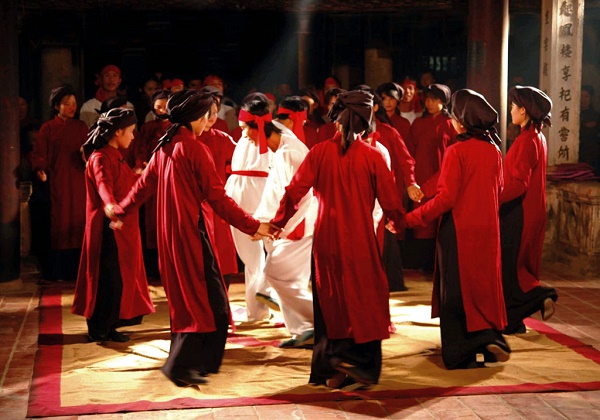.jpg) |
| Illustrative image |
Xoan singing is a genies-worshipping ritual. It consists of various elements, such as music, singing and dancing. Xoan singing is usually performed at communal houses and in early spring. There are three basic forms of Xoan singing, including singing to worship the Hung Kings and the village’s tutelary god, singing in a ceremony to pray for bumper crops and good health, and singing at the festivals where men and women sing duet love songs.
Xoan singing is associated with the stories about the era of the Hung King’s national construction. The original villages with Xoan-singing are ancient villages located in the centre of the old country of Van Lang, present-day Viet Tri City in Phu Tho Province. These villages include An Thai, Phu Duc, Kim Doi and Thet in Kim Duc and Phuong Lau Communes (Viet Tri City, Phu Tho province). This art has retained many ancient cultural features from the time when the Hung Kings built the country.
Traditionally, singers from Xoan guilds performed songs in sacred spaces such as temples, shrines and communal houses for the spring festivals. There are three forms of Xoan singing: worship singing for the Hùng kings and village guardian spirits; ritual singing for good crops, health and luck; and festival singing where villagers alternate male and female voices in a form of courtship.
.jpg) |
 |
Although only four traditional guilds remain, in recent years the singing has been taken up by clubs and other performing groups. Xoan singing is accompanied by dancing and musical instruments such as clappers and a variety of drums. The music has a spare structure with few ornamental notes and simple rhythms, and Xoan is characterized by a modulation between singers and instrumentalists at the perfect fourth interval. Knowledge, customs and techniques for singing, dancing and playing drum and clappers are traditionally transmitted orally by the guild leader. However, the majority of bearers are now over sixty years in age, and the numbers of people who appreciate Xoan singing have decreased, particularly among the younger generations.
Phu Tho Province is home to only 69 Xoan singing artisans, 31 of whom are from 80 to 104 years old, and only 8 people can teach singing. There are 81 Xoan singers but only 49 of them can sing fluently. Of the 30 relics of temples and shrines which were places for Xoan performances, only 13 remaining relics have been preserved, two relics have been severely degraded and 15 relics have completely disappeared.
 |
 |
These figures show that the teaching of Xoan singing to younger generations has many difficulties. Nguyen Thi Lich, a Xoan singing artisan, said: “In the past, Xoan singing was popular and performed at all festivals of the village, but with changes over time this art and the number of Xoan singing artisans has been on the decline.”
Recognizing Phu Tho’s Xoan singing as an Intangible Cultural Heritage of Humanity that needs to be urgently protected is not only good news for the people and authorities of Phu Tho Province, the birthplace of a unique type of singing, but also a great honour for all Vietnamese people.
Hong Nhung









COMMENTS